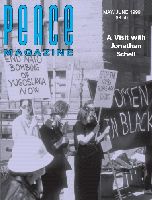
Peace Magazine May-June 1999, page 31. Some rights reserved.
Search for other articles by Mary Rawson here
John Mcmurtry. Toronto: Garamond Press, 1998
John McMurtry is a philosophy professor who approaches the topic of the global market from the standpoint of ethics. But with the combined weight of the topic and the method used, it is easy for the reader to get muddled.
The phrase, "Money is the root of all evil" would oversimplify McMurtry's message. Yet he singles out money as the element which ties the market system together - and as the focus of his attack. Quoting Adam Smith's statement that the operation of the free market "openly endorses the mass death of children," McMurtry hastens to add: "Surely only a heinous value system would serenely justify such an outcome." Surely it would! But surely Adam Smith did not, and never would, advocate value in the "market" as the overarching principle of social organization. A great deal of this book is both thoughtful and convincing, but it lays stress on the interpretation of Adam Smith by the "marketeers" - those economists who expound "free market" private enterprise and democracy as if together they were a god.
Having traced the origins of the "free market" theory back to John Locke (1690) and to Adam Smith (1776), whose views were, he says, grounded in an "openly moral philosophy," McMurtry asks: "What happened?" If the market system was to bring a better life to all, why can we find everywhere armaments, killing fields, malnutrition, brown water, and the disappearance of species? Why do we find, not life, but death?
The modern marketplace has left behind the Greek Agora with its practice of open air barter. Even by Diogenes's day (412?-323 BC) money had come into use, and it is to him we attribute the saying, "the love of money is the mother of all evils" - that to prefer the money measure of value, as against other values, we will get into trouble. The warning has been repeated for centuries.
But the use of money has made exchange easy. Money greases the wheels of commerce; no one wants to be without it. Yet McMurtry sees money as having been transmuted from a grease into a fuel, driving society instead of serving it. Money has become the sole measure of all value for almost everyone.
Latter day deviations from the original theory have also contributed to destructive policies. As McMurtry says, for 300 years the Locke-Smith formulation of the free market "continued as the received doctrine" and is still today the "ideology of the global economy," albeit with radical changes in meaning. McMurtry includes as "profound deviations" the following:
These "profound deviations" from the Locke-Smith formulation have served to remove its human content. No wonder that today's advisors propose economic/social/monetary policies that ruin nations.
McMurtry further addresses "unexposed contradictions" in Locke's own arguments regarding both money and the institution of private property. The marketeers have been content to leave these contradictions buried, thus remaining able to defend greed and extravagant riches as acceptable consequences of the market system.
For readers who are less interested in why things have got into a mess than in how to get out of it, McMurtry's final chapter is perhaps the most useful. Entitled "The Economics of Life and Death," this chapter describes the market's mutation toward a means of destruction and away from the life-supporting production understood in Smith's Wealth of Nations. McMurtry recognizes and accepts the necessity of "the civil commons" - what any legitimate government serves and supports but which is distinct from government. He calls for a radical change in the rules governing money creation and money transfer. McMurtry believes the flawed rules to be "at the hidden base of our deepest economic problems." What is missing, he says, is the social body's recognition of "the life-invading value program that disables it.... Monetary coordinates of value can only judge monetized sequences of value."
This book will be a useful tool toward mobilizing the global civil commons in a vital struggle.
Reviewed by Mary Rawson, of Vancouver.

Peace Magazine May-June 1999, page 31. Some rights reserved.
Search for other articles by Mary Rawson here